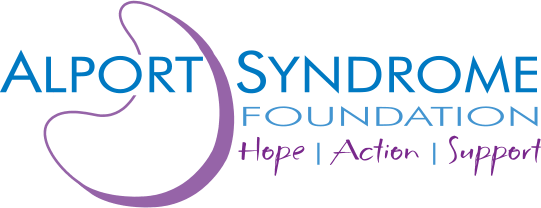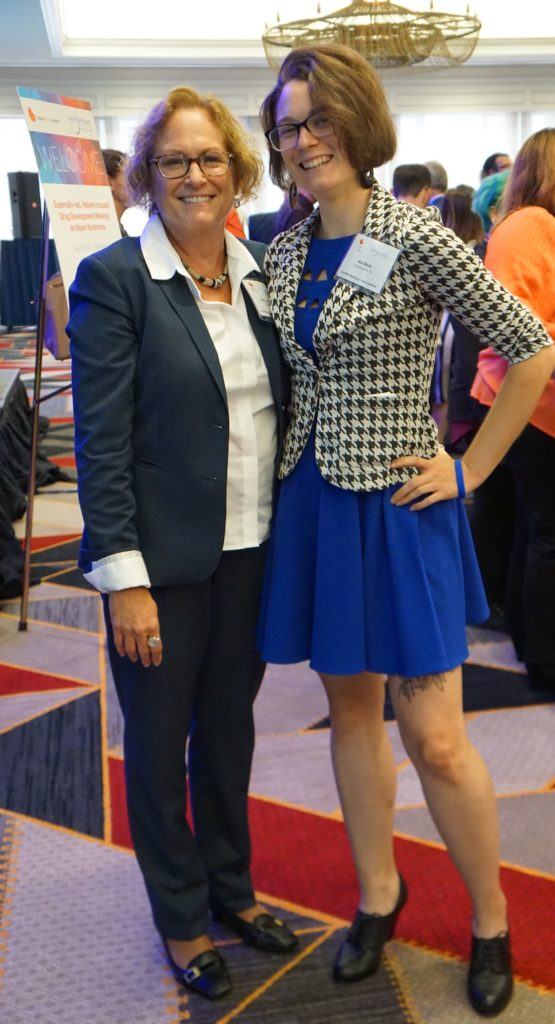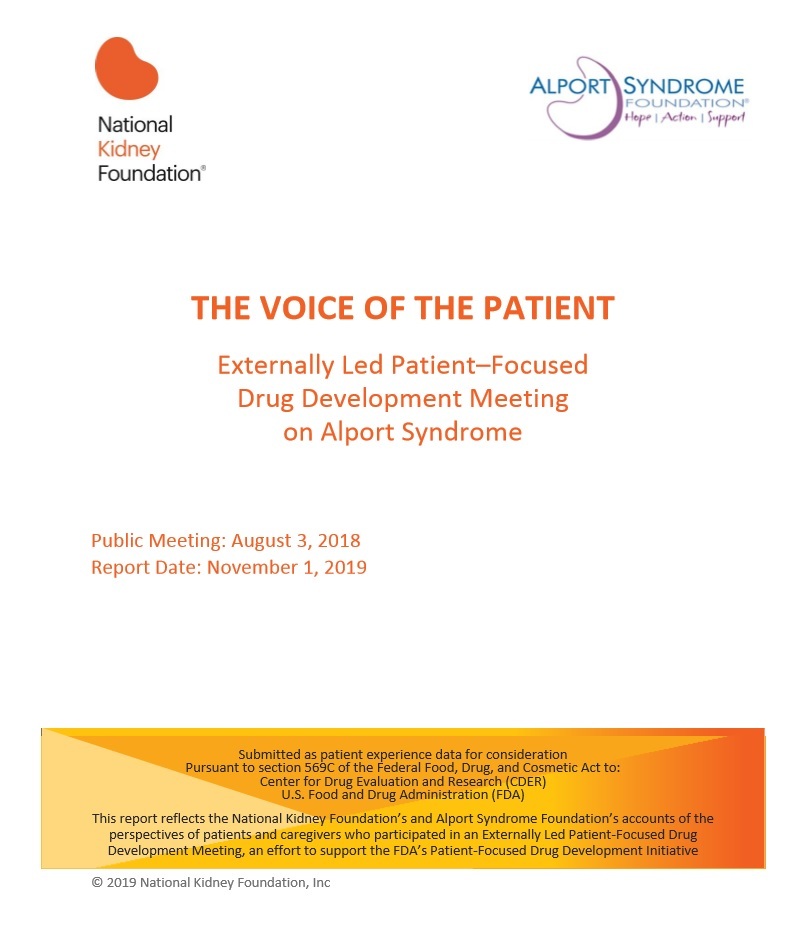In August 2018, Alport Syndrome Foundation collaborated with the National Kidney Foundation (NKF) to organize an Externally-Led Patient Focused Drug Development Meeting (EL-PFDD). Here’s why that’s important for the Alport Syndrome Community:
EL-PFDD meetings bring together patients and their care-partners, representatives from the FDA, pharmaceutical companies interested in developing drugs for the disease, and doctors who are experts in the specific disease – all to hear from patients about the disease in question. In these meetings, the patient’s experience is brought to the forefront for the FDA and pharmaceutical companies to understand. “Externally-led” refers to PFDD meetings that are led by organizations outside of the FDA.
The perspective of patients in effectively treating their disease is critical. How does the disease effect their everyday lives? What are the most challenging symptoms or burdens of living with the disease? There are more than 7,000 identified rare diseases, so it is challenging for the U.S. Food and Drug Administration (FDA) to deeply understand all of them as they consider trials and approvals of potential new therapies.
Externally-led Patient-Focused Drug Development (EL-PFDD) meetings play a valuable role in helping the FDA better understand a particular disease and its effects on patients and families, and what is meaningful to the people living with the condition.
Alport Syndrome Foundation is grateful to have partnered with the NKF to organize an EL-PFDD meeting focused on Alport syndrome. Deep gratitude goes to:
• National Kidney Foundation in partnering to organize this important event that documented the experiences of Alport patients from across the country.
• Alport patients who served on the panels, openly sharing their insights and experiences.
• Alport patients who participated in the meeting in person and online, to participate in the critical real-time survey process.
• Members of our Medical Advisory Committee who traveled to participate in sharing their expertise as clinicians treating Alport patients.
All the information gathered for the EL-PFDD meeting, and what was learned from the meeting are catalogued in one report called “The Voice of the Patient.”
Additionally, from this page you can:
- Contact Alport Syndrome Foundation and/or the National Kidney Foundation with specific questions.
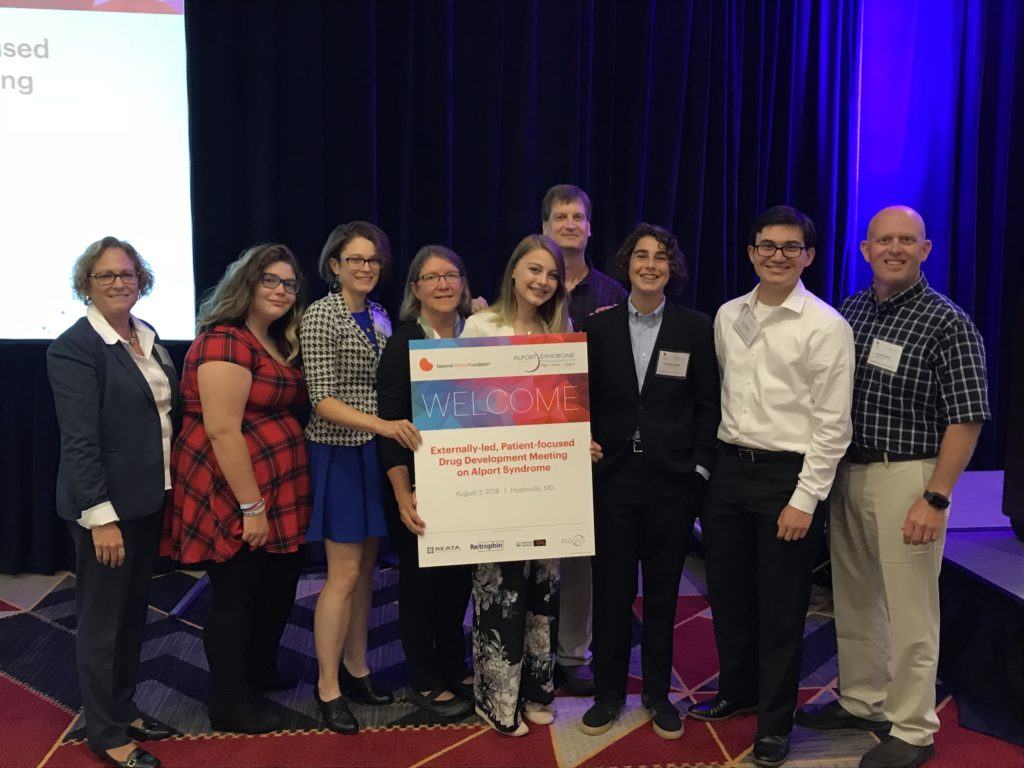
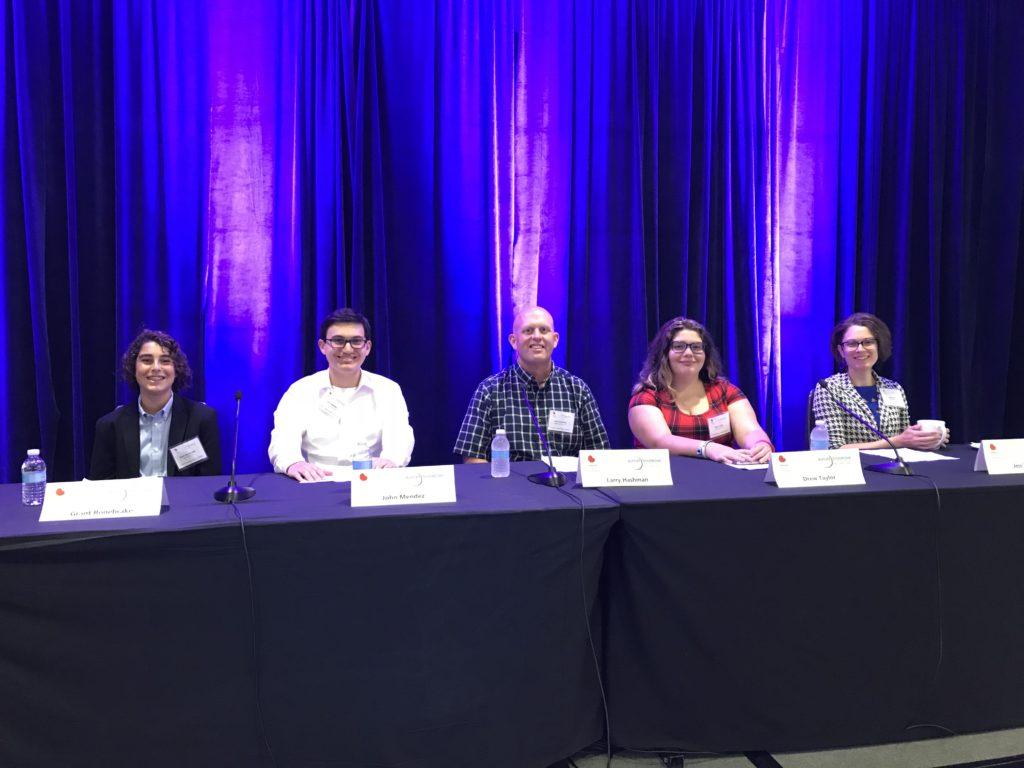
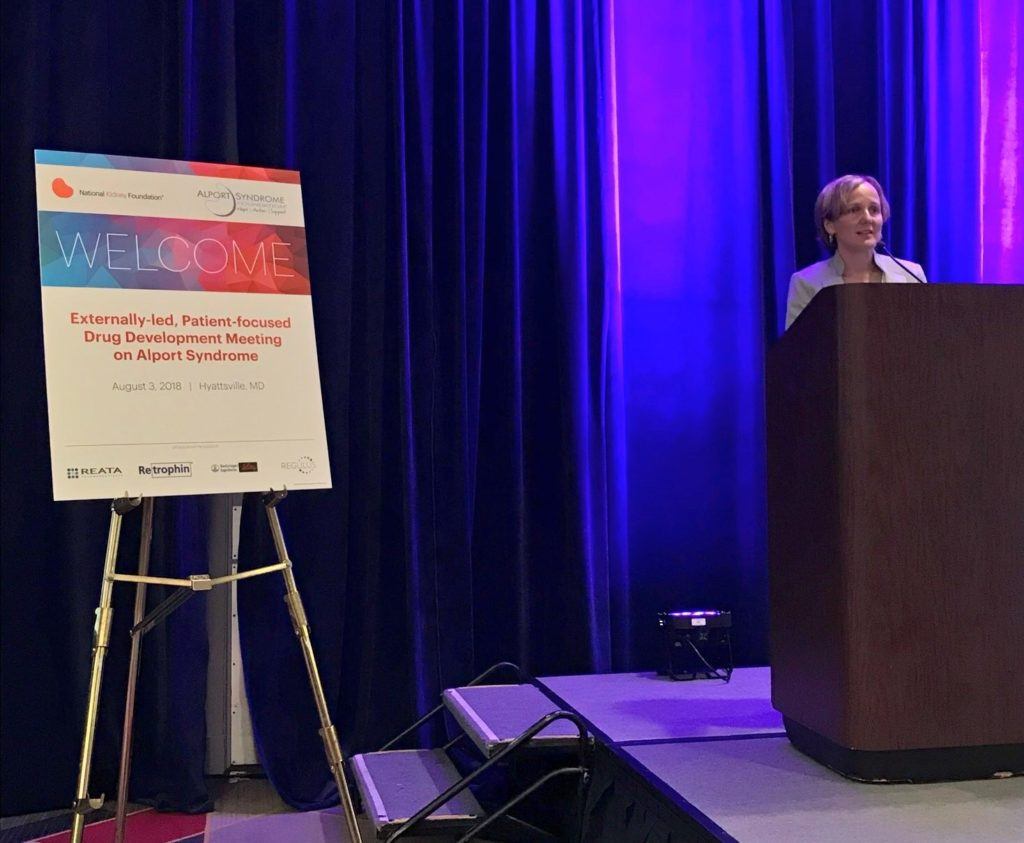
About Our Collaborative Partner in this EL-PFDD meeting:
The National Kidney Foundation (NKF) is the oldest non-profit health organization dedicated to preventing kidney diseases and improving the health and well-being of individuals and families affected by kidney disease. Education of patients and healthcare providers is a big part of the NKF’s work, and we support kidney patients by providing all sorts of educational materials, programs, and patient services. Visit the NKF website.
EL-PFDD meetings benefit:
Patients
- Patients know the FDA and drug sponsors have heard their voices (in person) about what is meaningful to them as it relates to potential drug therapies.
- Patients’ experiences are validated by all stakeholders.
- Hearing other patients voice their experiences and needs helps refine patients’ advocacy skills and bring more awareness to the disease.
Patient advocacy groups
- Identify priority needs for patient education, support and advocacy.
The FDA in its role to approve new medicines
- Helps the FDA to understand what it’s like to live with a particular disease, and therefore, what symptoms and burdens matter most to patients.
- Inform the FDA on what side effects patients may be willing to accept to gain a certain level of symptom relief or slowing of their disease progression.
- Assists the FDA determine whether a potential drug’s risks or deficits will be worth it’s benefits to patients, and how closely it will meet patients’ needs.
- Can support making medicines available to patients by helping to identify areas of unmet need in the patient population.
- Educate the FDA on patients’ preferences regarding participation in clinical trials. This enables the Agency to advise pharmaceutical companies on their trials.
- Assist the FDA in knowing if a new drug will address the needs of patients.
Pharmaceutical companies in their role to develop potential therapies
- Drug sponsors obtain insights into the major concerns of patients, thus helping them develop treatments that coincide with patients’ needs and preferences.
- Drug sponsors learn certain disease symptoms or treatment side effects that are, or are not, tolerable by the patients and can develop drugs accordingly.
- Advice to pharmaceutical companies from FDA- while a potential drug is being developed-can help to advance medicines that meet patients’ needs.
1
View a brief meeting summary
ASF Co-Founder and past President, Sharon Lagas, prepared a post-meeting recap.
2
Learn more about EL-PFDD Meetings
The Patient-Focused Drug Development (PFDD) initiative aims to more systematically obtain the patient perspective on specific diseases and their treatments. The patient perspective is critical in helping FDA understand the context in which regulatory decisions are made for new drugs.

Honorary Chairman of the Meeting
CLIFFORD E. KASHTAN, M.D., F.A.S.N.
Professor of Pediatrics, Division of Pediatric Nephrology, University of Minnesota (Minneapolis, MN)
Dr. Clifford Kashtan is Professor of Pediatrics (with tenure) at the University of Minnesota Medical School, and an attending Pediatric Nephrologist at the University of Minnesota Children‘s Hospital, in Minneapolis, Minnesota. He is board certified in Pediatrics and Pediatric Nephrology. He completed his medical school training at Wayne State University in Detroit, Michigan, his Pediatric residency at Boston City Hospital, and his Pediatric Nephrology fellowship at Massachusetts General Hospital and the University of Minnesota. He has been a member of the faculty of the University of Minnesota since 1987. He is a Fellow of the American Society of Nephrology and has served on the editorial boards of the Journal of the American Society of Nephrology, Nephrology Dialysis Transplantation and Pediatric Nephrology. He has also served as a Councilor of the American Society of Pediatric Nephrology. Dr. Kashtan has authored numerous original research articles, reviews and book chapters on Alport syndrome. He is also the author of the Alport syndrome entries at the online resources UpToDate and GeneReviews. He has lectured on Alport syndrome at numerous institutions and meetings, both nationally and internationally, and served as a consultant to foundations and biotechnology firms supporting Alport syndrome research and development of new treatments. Dr. Kashtan developed methods for diagnosing Alport syndrome by examining type IV collagen chains in kidney and skin biopsies. In 2007, Dr. Kashtan founded the Alport syndrome Treatments and Outcomes Registry (ASTOR), an effort to facilitate clinical trials of treatments for people with Alport syndrome.

Meeting Co-Chair
MICHELLE RHEAULT, M.D.
Professor of Pediatrics, Division of Pediatric Nephrology, University of Minnesota (Minneapolis, MN)
Dr. Michelle Rheault is a Board Certified pediatric nephrologist and Associate Professor of Pediatrics at the University of Minnesota Masonic Children’s Hospital in Minneapolis, MN. She completed her medical school training, Pediatric residency, and Pediatric Nephrology fellowship at the University of Minnesota Medical School. Her interest in Alport syndrome started during her fellowship training when she helped to characterize the first mouse model of X-linked Alport syndrome. From there, she turned her attention to clinical research and is currently co-director of the Alport Syndrome Treatment and Outcomes Registry (ASTOR) and an investigator in clinical trials of new therapies for patients with Alport syndrome. She has a special interest in women with Alport syndrome. Dr. Rheault has written a number of book chapters, reviews, and original science articles about Alport syndrome. In addition, she is on the steering committee for the Midwest Pediatric Nephrology Consortium and a member of the American Board of Pediatrics Subboard of Pediatric Nephrology.

Meeting Co-Chair
JAMES F. SIMON, M.D., MBA, F.A.C.P., F.A.S.N., F.N.K.F.
Professor of Pediatrics, Division of Pediatric Nephrology, University of Minnesota (Minneapolis, MN)
Dr. James Simon is currently a member of the medical staff in Nephrology at the Cleveland Clinic in Cleveland, Ohio. He is the Nephrology Fellowship Training Program Director. He is an Assistant Professor at the Cleveland Clinic Lerner College of Medicine. He received his medical degree from Loyola Chicago Stritch School of Medicine in 1998. He completed his internship and residency while on Active Duty in the Army at Brooke Army Medical Center in San Antonio, TX. He served as Chief Medical Resident at Brooke for a year before completing his Nephrology fellowship at Walter Reed Army Medical Center in Washington, DC. He returned to Brooke Army as a staff Nephrologist until 2007. His tenure there included a deployment to Iraq as part of Operation Desert Storm/Desert Shield and 2 years as chief of the Nephrology section. Upon separating from the Army in 2007, he came to the Cleveland Clinic where he served as Associate Program Director of the Nephrology fellowship until 2010 when he became Program Director, a position he currently holds. He also serves as the medical director of the anemia clinic within the department. He is Board certified in nephrology and internal medicine. He is active a member of the American Society of Nephrology’s training program directors executive committee. He has written questions for the Nephrology in-training exam and is participating in development of questions for the upcoming Kidney Self-Assessment Program.
